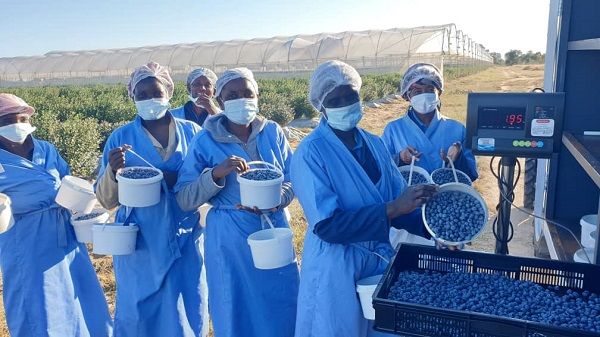
Mashare Berries kicks off second blue berry harvest for local and export market

What started as a modest agricultural pilot project at Mashare Village on the banks of the Kavango River some 50 kilometres downstream from Rundu, is blossoming into a successful agribusiness with massive growth potential. Mashare Berries, the grower of blue berries for the export market, has just started its second annual harvest, expecting to gather some 400 tonnes of blue berries this year.
The Investment Manager at Königstein Capital, Albert Basson, confirmed the positive outlook for the harvest, saying that about 300 people from Mashare Village will be working during the season to gather the harvest.
Königstein Capital is the fund manager of Spitz Capital, a Regulation 14 compliant unlisted investment vehicle, with the Government Institutions Pension Fund as principal investor.
Spitz Capital is the major investor in Mashare Berries.
Mashare Berries started a mere three years ago with the planting of the first 20 hectares as proof of concept. The first harvest produced 160 tonnes in 2020. Currently another 40 ha is being developed, bringing the total acreage to 60 ha.
The success of Mashare Berries has certainly proven the concept. Basson said Königstein Capital is now in the process of talking to more investors in Namibia, South Africa and overseas, to put another 600 ha under blueberries by 2025 with an expected harvest of 5000 tonnes. The first 200 ha of this ambitious expansion plan, has already been commissioned.
To date, the investment in Mashare Berries stands at about N$100 million. Taking the project to its full potential requires an additional N$150 million, a portion of which has been secured. Basson believes that the proven success of the first two phases will enable Königstein Capital to raise the funding required to reach its full potential.
It is expected that in 2025, Mashare Berries will employ about 60 people full-time and provide seasonal employment during the harvest to about 1200 people. Taken together with the sister projects in Königstein’s agribusiness portfolio and pipe-line, by 2025 the Kavango East region should produce more than 5,000 tons of blueberries annually, employ more than 250 people permanently and 5,000 as seasonal workers.
Mashare Irrigation, another portfolio company of Spitz Capital, produces cash crops such as wheat, maize and potatoes for the Namibian market. The company currently has 400 hectares under irrigation with a further 280ha under development.
Mashare Berries markets its produce under the Namib Blue label. The commercial plantings to date consist of three Fall Creek varietals, and the project has made trial plantings of other varietals.
Basson said that most of their harvest, around 95%, is exported since the local market is too small to absorb their whole harvest. Part of Mashare Berries’ success rests on the fact that markets were identified before the project was launched. To date, Mashare Barries has supplied berries to customers in Europe, the UK, Russia, Hong Kong and several countries in the Middle East. They are also looking at securing access to markets in China to further expand the project’s long-term growth ambitions.
Since blue berries are a cash crop, the prices are determined largely by supply. This leads to fluctuations in price during the harvest season but it is not unlike any other fresh produce like grapes or dates. “Understanding what the market wants, and when it wants it, remains an important success driver,” said Basson.
Looking at the future, he said Königstein Capital’s original vision with export-oriented fruit production is to produce premium world class fruit with strong job creation characteristics while being competitive on the international markets. This vision remains the focus.











































